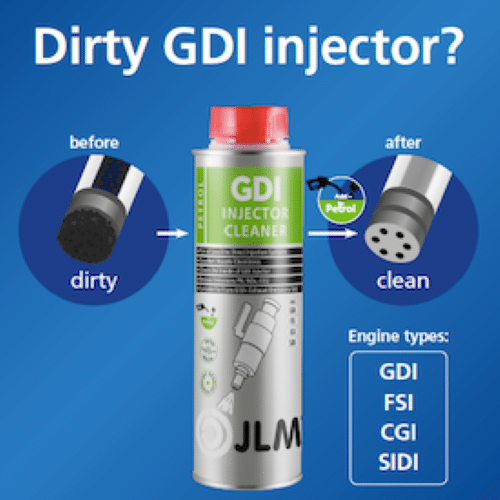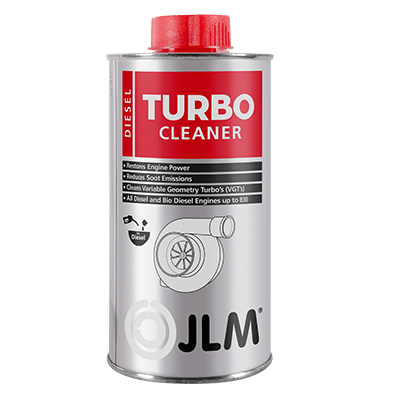As petrol engine and fuel system technology has evolved into Gasoline Direct Injection (GDI), JLM Lubricants explains why its latest fuel injector cleaner is so beneficial for modern engines.
The gasoline/petrol engine is a remarkable invention. Being in mass production for well over a century, it has become so universal that it is hard to imagine life without it. Yet, it is rather wasteful and subsequent developments have focussed on not only making it more efficient but also reducing its tailpipe emissions. Unfortunately, not all advances are perfect; thankfully, JLM Lubricants is here to help.

GDI – a compromised development
With the benefit of hindsight, perhaps the European political decision to incentivise low carbon dioxide (CO2) emitting cars alone through the taxation system in the late 1990’s was not a wholly good idea. While new car engine developers could reduce both carbon dioxide and toxins (such as NOx), a tipping-point was reached, where the goal of lowering CO2 further resulted in a greater quantity of harmful pollutants being created. This is one factor that led to a surge in the popularity of diesel cars and the subsequent manipulation of new car emissions tests that culminated in the ‚Dieselgate‘ scandal. Gasoline engines, however, are far from saintly.
As Gasoline Direct Injection (GDI) was used initially in fighter aircraft, it is somewhat ironic that Mitsubishi, former maker of the Zero Fighter WW2 kamikaze plane, introduced the first European-built mass-produced GDI car in 1996, beneath the bonnet of its Dutch-assembled 1.8-litre Carisma. Lower fuel consumption, higher power outputs and reduced CO2 emissions were achieved mainly by repositioning the fuel injector within the cylinder, instead of behind the inlet valve on the earlier indirect multipoint port injection arrangements. Increasing fuel pressure by 20 times more than that of port injection systems and adopting more sophisticated injector hardware and engine software were also crucial developments to ensure that engineers could meet their CO2 targets. Yet, there was a price to pay, even when new. GDI engines are more sensitive to fuel quality and can produce over 1,000 times the number of cancer-causing particulates (soot) than port injection injections. Reducing pollutants from diesel engines seemed to be the priority so that, when Euro VI exhaust emission standards were introduced in 2015, the particulate limits for petrol and diesel cars were identical. Only when twenty years passed since Mitsubishi’s Carisma entered production did governments and carmakers address GDI’s dirty secret and gasoline particulate filters (GPF) are now starting to be installed on new cars.
GDI problems in your workshop
GDI compromises not only tailpipe emissions but also long-term reliability. Tighter tolerances of its mechanical parts and higher soot production make the engine highly sensitive to contamination, which has far reaching implications for its real-world efficiency. As the fuel injectors are exposed to not only the heat but also the by-products of the combustion process, contaminations become baked onto the injector tip, blocking its fine holes (possessing smaller diameters than that of a human hair) and altering the spray pattern. Sophisticated engine management will compensate for this injector fouling by adjusting the fuelling automatically but only to a point. When the long term fuel trim deviates beyond a typical 25% from its standard setting, the engine warning lamp is likely to illuminate. Exhaust emissions will also rise, to an extent that the car is likely to fail its annual inspection. Once this stage is reached, it is too late for preventative maintenance.
The challenge for the workshop is not only to cure a reported fault, caused by GDI contamination, but also to curtail future deposit build-up. Being not only a seller but also a manufacturer and developer of fuel and oil additives, JLM Lubricants realised that current fuel injector cleaners tended to be inadequate for the more stubborn contaminations that afflict GDI fuel systems.
„Additive technologies and the means of testing them has to keep-up with engine development“, reports Gilbert Groot, MD of JLM Lubricants, who emphasises that, „The arrival of mandatory stop-start, hybrids that may experience cooler running temperatures and harder working, turbocharged, small capacity engines have shown that traditional fuel injector cleaning formulations are inadequate. Instead of making our port injection cleaner more concentrated, JLM has defined a new path. Our dedicated GDI Cleaner not only removes injector and fuel system deposits but also helps to prevent them from reforming again.“
Does the JLM GDI Direct Injection Cleaner work?
Laboratory tests at the Millbrook Proving Ground in Bedfordshire, England, during 2019 showed that JLM GDI Injector Cleaner’s active ingredients are effective at not only removing and inhibiting fuel injector contamination but also fuel consumption decreases by just over 4%. Particulate emissions reduced, too, which is one reason why deposits levels within the intake manifold and behind the inlet valves were shown not to have increased during the tests, due to reduced soot levels being introduced via the exhaust gas recirculation (EGR) valve. For a professional workshop, a further benefit is the speed at which the additive works, as Mr Groot explains:
„The tests also showed that the JLM formulation gives faster and more complete clean-up performance, compared to other detergent technologies that may (or may not) have only partial benefits for GDI.“
Even so, JLM admits that its GDI Injector Cleaner cannot address GDI contamination in every area. Yes, its friction modifiers reduce fuel use. Yes, its anti-oxidants assist fuel stability (which is especially useful for modern ethanol petrol blends). Yes, its corrosion inhibitor has obvious benefits, not withstanding its injector cleaning and contamination prevention properties; but even it cannot clean areas that cannot be reached. Deposits in the crankcase that restrict low tension piston ring movement,
which are employed in many GDI engines, are best addressed with JLM’s Engine Oil Flush at every service, to restore the resultant lost compression. While more complete combustion has the additional benefit of reducing inlet deposits, JLM’s GDI Injector Cleaner cannot clean clogged intake manifolds, EGR valves and cylinder head ports. For this, JLM recommends its Air Intake Cleaner both as a cleaner and a preventative measure at service time.
With its new GDI petrol injector cleaner joining forces with its existing Engine Oil Flush and Air Intake Cleaner products, JLM Lubricants allows workshops to offer the complete GDI decontamination cure to benefit the motorist, their cars and, of course, the environment.
The latest product from JLM lubricants is a fuel system additive, dosed into the fuel tank, which addresses the real-world issues that technicians experience with modern direct injection petrol engines.
Mitsubishi GDI
Certain manufacturers continue to badge their cars and engines with ‚GDI‘ nomenclature – ‚D‘ does not always stand for ‚Diesel‘ but also ‚Direct‘.
Direct Injection
Direct Injection is used on both petrol and diesel engines, which sees the fuel injector placed directly into the combustion chamber.
Direct Fuel Injector
In order for it to be distributed within the cylinders as a fine mist, prior to combustion, not only must the petrol be pressurised to around 100BAR (around 1450psi) but the fuel injector must be engineered to very fine tolerances.
Dirty Injectors
Due to the exposure to higher temperature, fuel can oxidise partially as it exits the injector body. Soot, wax and tar deposits build on the injector tip surprisingly quickly. The resultant build deflects the spray pattern, which is crucial for efficient combustion. As an alternative to removing the fuel injectors and having them cleaned ultrasonically, JLM’s GDI Injector Cleaner is dosed into the fuel tank and is proven to not only remove these deposits but also to reduce the rate of future contamination.
Sticky Valves
Due to the inlet valves and their ports not being cleaned continuously by petrol on non-GDI engines, deposit build is a known problem. Sticky viscosity improvers in the engine enter via the breathing system, catching particulates and other matter from the EGR system. These can build to such an extent that valve operation and airflow is affected. You may encounter certain engines that combine direct and port injection; in those cases, JLM’s GDI Injector Cleaner can still be used to cleanse and maintain the entire fuel system.

